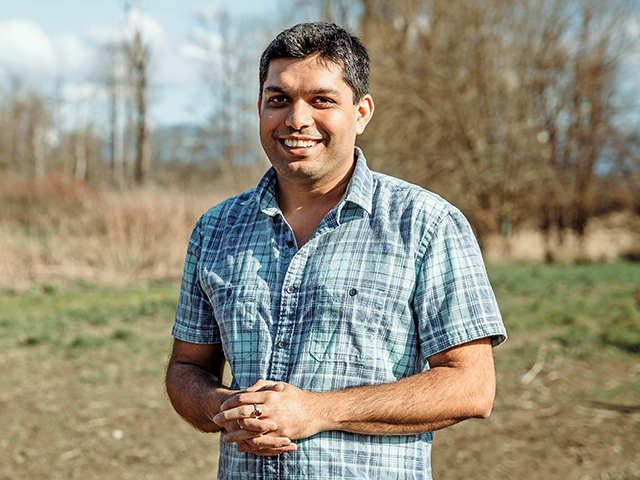Developing Technologies to Help Farmers
Summit Speaker Shares Motivation Behind Microsoft Project to Benefit Farmers
Microsoft Azure Global Chief Scientist Ranveer Chandra admits he didn't like his early experiences with agriculture.
"I grew up in a city in India, but for the first 18 years, I spent a lot of time at my grandparent's farm. They had a mango orchard and grew wheat, rice and sugarcane," said Chandra. "Back then, I didn't like agriculture much. The farms didn't have electricity or indoor toilets. You had to go to the bathroom in the field," he said.
"I look back at the extreme poverty and the primitive forms of agriculture. These images are stitched in my mind. When I started at Microsoft Research, I wanted to develop technologies to help farmers. They do so much for us growing our food and making sure we are all well-fed. We have a responsibility to them to make sure they lead better lives. That is one of the motivations for starting Microsoft Azure FarmBeats," said Chandra, now a partner researcher at Microsoft Research. Chandra started the FarmBeats project in 2015 and has led it ever since.
"People often ask why? Microsoft doesn't do agriculture. We work with companies across all sectors. We look at it as an opportunity to bring the benefits of digital transformation, to help farmers be more productive and sustainable," he said.
Chandra's past research has shipped as part of multiple Microsoft products and filed more than 100 patents.
A CLOUD FOR AGRICULTURE
Microsoft Azure FarmBeats is a purpose-built, industry-specific cloud platform built on top of Azure to enable actionable insights from data, Chandra explained.
P[L1] D[0x0] M[300x250] OOP[F] ADUNIT[] T[]
"We're building a platform that can help ag tech companies gather large amounts of data in the cloud and merge data sources such as field and yield maps, satellite imagery, sensors and weather stations to allow data scientists to run artificial intelligence models, and bring the benefits of data-driven agriculture to farmers.
"FarmBeats is partnering with several agricultural companies, such as Land O'Lakes, to make it happen. We have DTN for weather data," he said.
"If you can use data and data-driven insights to augment a farmer's knowledge, not replace it, they can be more productive. It will help them grow more and earn more profit. It will help them adopt sustainable agricultural practices."
SUSTAINABLE FUTURE
As for sustainability, the world needs to reduce greenhouse gas emissions, he said. "Agriculture can help. But, how do you measure how much carbon is sequestered (with agricultural practices)? That's where digital tools can help."
Chandra predicted the future of agriculture will be more data-driven.
"Precision agriculture is starting to get adopted at a certain level. But, despite all these innovations, we are still scratching the surface of what can be done.
"Management zones now could be a few acres, but it could be at a micro level down to a few inches. What if you could predict what's going to happen in the future and make defensive treatments in different parts of the farm? This could be chemicals, fertilizer or water. This is the future where you can be more productive and cost-efficient."
**
Editor's Note:
To hear the full presentation by Chandra, register for the virtual DTN Ag Summit at www.DTN.com/agsummit20. Chandra's session begins at 9:50 a.m. CST on Monday, Dec. 7, and is followed by a panel of ag technology experts discussing some of the recent ways data is helping farmers profit more and add resilience to their operations.
Registering for Ag Summit will allow you to hear these and many other presentations live, or log on later to catch the recordings. Your registration will allow you to access the full Summit content through Jan. 8, so you'll have plenty of time to catch sessions you may have missed or to review sessions you wanted to listen to again.
Matthew Wilde can be reached at Matthew.Wilde@dtn.com
(c) Copyright 2020 DTN, LLC. All rights reserved.




